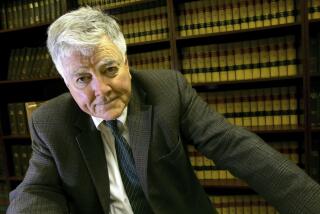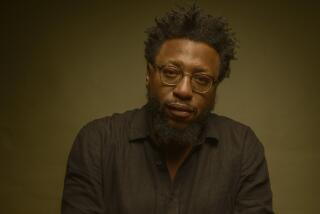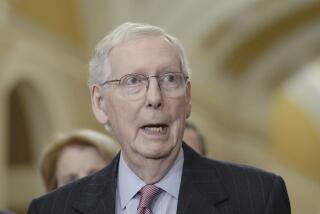McGovern Returns to His Roots--Teaching on College Campus : Presidency: Cornell students vie to get into his U.S. foreign policy class. Exaggerated fear of communism, he says, cost him his Senate seat.
- Share via
ITHACA, N.Y. — Heads turn and passersby smile in recognition when George McGovern walks along the stone paths of the Cornell University campus.
“You probably get this all the time, but when I turned 18, you were the first person I voted for,” says a faculty member, beaming as he shakes hands with the former senator from South Dakota and 1972 Democratic presidential nominee, who won only one state, Massachusetts, in his loss to Richard M. Nixon.
McGovern smiles, thanks the man and chats briefly before moving on. He does get that all the time, ever since his unsuccessful bid for the presidency. “It’s nice,” he says.
Since losing his Senate seat in 1980, McGovern has been teaching at colleges across the nation. This semester he is at Cornell, where hundreds of students vied for spots in his once-weekly class on American foreign policy.
Teaching is a return to his roots for McGovern. He began his career in 1949 as a history professor at South Dakota’s tiny Dakota Wesleyan University. He spent most of the next three decades outside the classroom, making a name in state and national politics and challenging the United States’ role in the war in Vietnam. McGovern says he never stopped considering himself a teacher.
“That historic perspective has frequently given me a different view of events,” he says.
“I really knew quite a lot about Vietnam before we ever got involved. And I always thought if you looked critically and closely at the history of Vietnam, we might never have gone in there.”
McGovern is 68 now. His hair and eyebrows have turned almost white, and the creases on his forehead have deepened in the years he has been out of the national spotlight.
Dressed in a dark blue pin-stripe suit and wearing thick black plastic-rimmed bifocals that he takes on and off as he speaks, he looks more like an elder statesman than a maverick politician who challenged the Establishment throughout his tenure in office.
The tall ex-senator cuts an imposing figure at Cornell. His steady voice with a hint of Midwestern twang easily hushes the 300 young people crowded into Statler Hall, a blue-and-purple-toned auditorium in the college’s hotel administration school.
McGovern lectures in a conversational style, sprinkling his talk with references to his own involvement in shaping the nation’s history. He tells students he doesn’t want to be too partisan--although he leaves little doubt where he stands--and he sounds more regretful than angry when he speaks of policies he opposes.
In a lecture on the Cold War, McGovern traces Republican attacks on the Democrats for “losing” China and being soft on communism to the GOP’s frustration over having lost five consecutive national elections.
“It set off a kind of political fury on the part of the Republicans,” he says. “I can understand that,” he adds, laughing. “After you’ve lost so many times, you get to the point where you want to get somebody--you just want to hit anybody.”
He says the public had an exaggerated fear of the communist threat that dogged him throughout his political career. He and others who called for negotiation, not confrontation, were labeled appeasers, or worse.
“I have no doubt at all I’d still be in the Senate if not for this fear,” he says.
Most of the students filling the lecture hall were still in diapers when McGovern ran for President and not yet in high school when he left the Senate. But they say they knew his name and the views he represents.
“I knew that he was a big liberal,” says Audrey Van Voden, a government major from Syracuse.
“I just knew he ran for President,” says Julie Brof, a policy analysis major from New York, adding that she thinks his class is “fabulous.”
At the end of class, McGovern allows time for questions. No one leaves the auditorium. A student asks about political role models, and McGovern mentions Adlai E. Stevenson, a fellow would-be President.
“Stevenson got me into politics, and that’s probably enough to persuade some people that he had an evil influence,” he says, chuckling.
Another student asks about Arkansas Sen. J. William Fulbright’s opposition to the Vietnam War.
“It just so happens I had dinner with Sen. Fulbright last week,” McGovern says. Fulbright, he adds, is most proud of the student exchange program he established in his first year in office in 1942, not the Vietnam hearings he presided over.
Responding to another student’s question, McGovern dismisses the impact of communism in the United States.
“Anyone here ever meet a real live member of the Communist Party?” he asks. One student raises his hand. “What did he look like?” McGovern asks, joining the audience in laughter.
After class, McGovern lingers for one-on-one conversations with the eager students who swarm around him. Brof asks him to meet with the campus Democratic organization and leaves delighted when McGovern offers to have breakfast with the group.
“I wish I had been around when he ran for President,” she sighs. “I was 2 years old.”
After class, over lunch in the hotel school’s restaurant, McGovern says he hasn’t ruled out running for President again if the opportunity presents itself. He misses the national forum of the Senate and, especially, of a presidential campaign.
“Whether you win or lose, tens of millions of people hear you,” he says. “I do miss that. If I really thought in any given campaign that I could get across certain ideas to the American public, I might run for President just to make the case.”
(Later, in an interview published Friday with the Boston Herald, McGovern said he will decide within 90 days whether to run in 1992. “I think it’s possibly a doable campaign,” he was quoted as saying, adding that he expects “people-oriented economic factors” to be the pivotal issues.)
McGovern blames recent leaders for failing to set a more altruistic example for the next generation. The Reagan-Bush years, he says, “reassured people that greed is all right, that raw competition with one’s fellow human beings is the way things should be.”
He sees the effects of that leadership on students, he says, reluctantly criticizing the young people who have always been among his biggest fans.
“There’s still a little too much materialism and not enough idealism,” he says. “I don’t want to say that in any harsh way. It’s just a mild disappointment on my part, that material values still seem to dominate much more than any idealism.”
But that materialism may be waning, McGovern says. He hears it in the questions students ask and sees it in their growing activism on issues such as the environment. He says he senses a growing desire for leaders who will put the interests of the public first.
“I think there’s a quickening of interest now,” he says. “It isn’t as strong as it was in the ‘60s, but I do think there’s a modest comeback. The trend is in the right direction.”
McGovern looks out the restaurant window at students rushing across the campus below. He has high hopes for the future those young people represent, and for the history that is yet unwritten.
Perhaps, he says, the dramatic crumbling of East-West differences over the last year means that the world is finally going to figure out how to live in peace. Even the Persian Gulf crisis may have a silver lining, in that the United Nations is emerging as an effective forum for resolving international problems, he says.
“For many years I have believed that what is now happening could have happened,” McGovern says.
“I guess I’ve always been an optimist. I don’t know how you can live any other way and get much out of life.”
More to Read
Get the L.A. Times Politics newsletter
Deeply reported insights into legislation, politics and policy from Sacramento, Washington and beyond. In your inbox twice per week.
You may occasionally receive promotional content from the Los Angeles Times.










